Current News
/ArcaMax
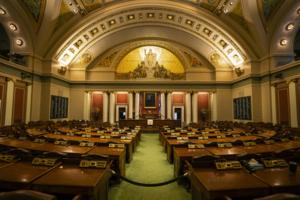
Minnesota lawmakers strike a deal on state budget, Gov. Tim Walz calls Monday special session
MINNEAPOLIS — Gov. Tim Walz and Minnesota’s narrowly divided Legislature have struck a deal on the state budget and will return to St. Paul on Monday to finish their work.
Walz and legislative leaders announced Friday they’ve agreed to a one-day special session that must adjourn before 7 a.m. Tuesday. Their two-page signed agreement, ...Read more

'Fraudulent EMT' gave medical care to 100-plus people in Colorado, officials say
A “fraudulent EMT” is accused of providing medical care to more than 100 people even though he wasn’t certified, Colorado officials said.
Lauren Wilson, 53, was indicted in connection with unauthorized practice of medicine while fraudulently representing to be a certified professional, along with other charges, the Colorado Attorney ...Read more
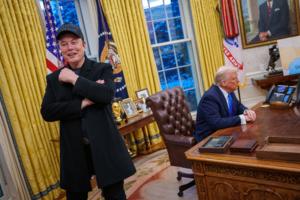
Trump says Musk 'has lost his mind' as feud with Tesla tycoon continues
President Donald Trump continued his war of words with Elon Musk on Friday, saying the Tesla tycoon “has lost his mind” — even as Musk seemed to be softening his stance in their epic feud.
Trump on Friday told reporters that while Musk may be ready to make amends, he’s not ready to rekindle his friendship with the tech billionaire, ...Read more
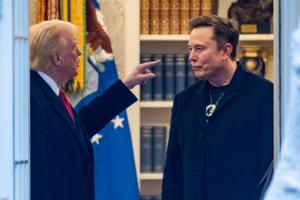
Trump's spending bill is floundering in the Senate as Musk attacks intensify
WASHINGTON — The clamorous end to President Trump’s alliance with Elon Musk is increasing pressure on the White House over its signature legislation known as the “One Big Beautiful Bill Act” — a bill under intense scrutiny in the Senate that Musk wants killed over its price tag, but that Trump views as critical to the success of his ...Read more

Jose Ibarra's attorneys seek mental evaluation, DNA expert in Laken Riley murder case
ATHENS, Ga. — Lawyers for Jose Ibarra, the man convicted of murder in the killing of college nursing student Laken Riley, told a judge Friday they intend to file motions seeking a mental competency evaluation and funding for a DNA expert to review forensic evidence.
The brief virtual hearing with an Athens-Clarke County judge was a status ...Read more

Sean 'Diddy' Combs ex-girlfriend in tears during testimony over coerced sex with strangers
NEW YORK — A young single mom who was involved with Sean “Diddy” Combs until his arrest last year laid out gut-wrenching accounts of being sexually exploited by the multimillionaire rap mogul at Manhattan Federal Court on Friday.
In explicit detail, “Jane,” a pseudonym, described multiple nights she spent sleeping with strangers in ...Read more

North Carolina high school student gets $20,000 and apology for suspension after 'illegal aliens' comment in class
RALEIGH, N.C. — A North Carolina school district has agreed to pay $20,000 and publicly apologize to a high school student who was suspended and accused of making “racially insensitive” comments for saying “illegal aliens” in class.
Christian McGhee was suspended for three days in April 2024 after asking his English teacher at Central...Read more
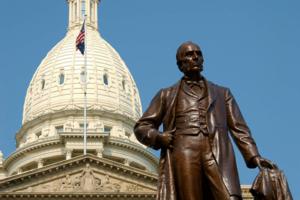
'No one will know': Records reveal secret money flowing through Lansing, Michigan
LANSING, Mich. — Money from some of Michigan's largest companies and wealthiest business executives secretly flowed to a fundraising account for state Senate Republicans during the early days of the pandemic, according to a trove of court records.
Dick DeVos, husband of then-U.S. Senate Education Secretary Betsy DeVos, gave $50,000 to the ...Read more
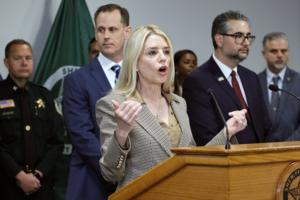
Florida Bar rejects complaint from group accusing Bondi of 'misconduct' as attorney general
MIAMI — During her Senate confirmation hearing for U.S. Attorney General, Pam Bondi tip-toed around whether she would stand up to President Donald Trump’s pressure on the Justice Department, promising only in a broad sense that “politics has to be taken out of this system.”
Since her confirmation in February, Bondi has earned the praise...Read more
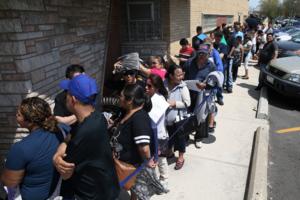
ICE subpoenaed Chicago for records of applicants in city ID program used by immigrants
CHICAGO — U.S. Immigration and Customs Enforcement subpoenaed the Chicago City Clerk’s Office in April for the personal information of applicants to a municipal ID program popular with immigrants, an apparent new tactic in Republican President Donald Trump’s plan to target Chicago as he seeks to ramp up deportations.
The clerk’s office ...Read more
As FIU fades, push for a Trump presidential library shifts to downtown Miami
MIAMI — Could Miami’s Freedom Tower have a MAGA tourist attraction as a neighbor?
Eric Trump, the presidential son helping vet sites for his father’s future library, earlier this year visited parking lots next to the historic building in downtown Miami as part of the vetting process for potential sites, a Trump Organization lawyer said.
...Read more

Poll: 52% of Americans side with 'neither' Trump nor Musk in public fight
If a new YouGov poll is any indication, the public is still digesting this week’s explosive fallout between President Donald Trump and former Department of Government Efficiency (DOGE) leader Elon Musk.
Some 52% of respondents to Thursday’s poll said they side with “neither” Trump nor Musk as the world’s most powerful man and world’...Read more

Man with 'anarchy' button scrawls antisemitic graffiti on NYC Jewish art museum
NEW YORK — A man sporting an “anarchy” button is being sought for scrawling the word “Gaza” on a Greenwich Village Jewish art museum, police said Friday.
The vandalism comes amid continued strife in the Middle East and a jump in antisemitic attacks throughout the country.
Workers at the Dr. Bernard Heller Museum on W. 4th St. near ...Read more

Trump's top spiritual adviser visits Miami megachurch. She shares a prophecy
MIAMI — President Donald Trump’s top spiritual adviser visited a southwest Miami-Dade County megachurch to outline a vision of a Christian-dominated world and urge believers, particularly Evangelicals, to help make it a reality.
In a two-hour sermon on Thursday, Florida Pastor Paula White-Cain — a prominent televangelist and senior ...Read more

Prominent lawyers join press freedom fight to thwart Paramount settlement with Trump
With new legal muscle, the nonprofit Freedom of the Press Foundation is upping pressure on Paramount Global to abandon efforts to settle President Donald Trump’s $20 billion lawsuit targeting CBS and “60 Minutes.”
Respected Washington litigator Abbe David Lowell this week joined the team representing the New York advocacy group, which has...Read more
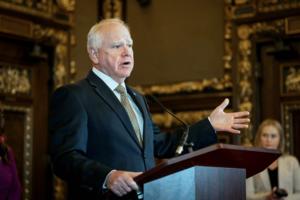
State had no advance notice of federal raid in Minneapolis, Gov. Tim Walz says
MINNEAPOLIS — Federal law enforcement agencies did not warn state officials before they raided a Mexican restaurant in south Minneapolis earlier this week, Gov. Tim Walz said Thursday.
“They didn’t tell us what was happening,” Walz told a group of States Newsroom editors, according to a recording of the interview shared by Walz’s ...Read more

Mexican naval vessel that struck Brooklyn Bridge towed across East River for repairs
NEW YORK — The Mexican naval vessel that struck the Brooklyn Bridge last month was towed across the East River to the Brooklyn Navy Yard early Friday, where it will be dry-docked and repaired, city officials said.
The U.S. Coast Guard set up a “safety zone” in the East River Friday morning so the ARM Cuauhtémoc could be slowly towed to ...Read more
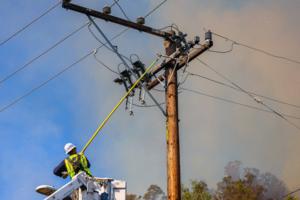
California Senate greenlights energy reform bills as Democrats pursue “affordability”
After falling short last year, lawmakers in the state Senate are advancing a flurry of bills intended to give customers relief from ever-rising electricity bills and rein in investor-owned utilities like PG&E, which is raking in record profits. The plans are central to the promise of Gov. Gavin Newsom and top Democrats to make California more ...Read more
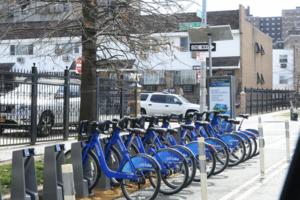
Citi Bike agrees to curb e-bike speeds at 15 mph after service suspension threat from NYC Mayor Eric Adams admin
NEW YORK — Citi Bike has agreed to curb the speed at which its e-bikes can go at 15 miles per hour — a move that came in response to a service suspension threat from Mayor Eric Adams’ administration.
The electric Citi Bikes can currently ride at 18 miles per hour, a limit the service’s operator, Lyft, previously set as part of an ...Read more

Axiom Space's record-setter to lead astronauts from 3 nations on private mission
Peggy Whitson has spent nearly two years of her life in space as an Axiom Space employee and former NASA astronaut.
Next week she’ll lead a mission with three men representing countries that haven’t sent anyone to space in more than four decades.
Whitson, 65, will command the Ax-4 mission targeting liftoff as early as 8:22 a.m. Tuesday ...Read more
Popular Stories
- Everyone from Jon Stewart to Alex Jones is weighing in on the Trump/Musk feud
- 'Unfortunately, Altadena is for sale': Developers are buying up burned lots
- Michelle Obama shares her honest thoughts on Malia dropping last name
- Duke University to offer more buyouts, anticipates layoffs under funding threats
- Musk walks back threat to decommission SpaceX Dragon spacecraft





